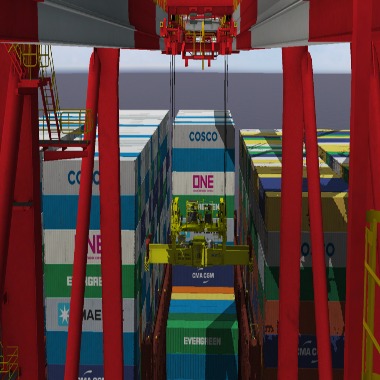2024.10.20 23:55
A Case Study:
Revolutionizing Learning in Oil and Gas: A Unified Approach for a Global Workforce
A leading oil and gas corporation with operations spanning across onshore and offshore environments, faced the challenge of effectively training its diverse workforce of over 1200 employees from 100+ nationalities working in diverse offshore and onshore environments. To meet this challenge, the company embarked on a journey to implement a robust Learning Management System (LMS) coupled with an innovative digital learning solution tailored to the unique needs of its global workforce.
Objectives
Global Accessibility:
-
Facilitate training for employees worldwide, overcoming geographical barriers.
-
Provide a standardized learning experience across diverse cultures and languages.
Adaptability to Industry Standards:
-
Ensure compliance with industry regulations and safety standards.
-
Enhance technical skills and knowledge to keep up with evolving technologies in the oil and gas sector.
Cost-Efficiency:
-
Streamline training processes to reduce costs associated with traditional training methods.
-
Monitor and track training expenses, ensuring optimal resource utilization.
Customization and Personalization:
-
Tailor learning paths based on individual roles, ensuring relevant and targeted content.
-
Enable employees to learn at their own pace, promoting a personalized learning experience.
Key Features
Course Accreditation: Courses within the system shall accredited , ensuring alignment with industry standards and compliance requirements.
Employee Engagement: The system shall facilitate active engagement during training, encouraging interaction, discussion, and collaboration among employees participating in the learning modules.
Interactive Assessments: Interactive assessments shall comprise a series of questions designed to offer personalized results and feedback based on the respondent's answers, enhancing the effectiveness of the learning experience.
Language: The system and courses shall be available in multiple languages. A local language version for trainings shall be introduced, catering to the diverse linguistic needs of the global workforce.
Certification: The system shall enable the issuance of certificates upon training completion. Certificates shall be downloadable immediately after training completion. The system shall support additional customization options for certification.
Multi-Device Access: The system shall be multi-platform compatible, allowing training access globally via a wide variety of devices to accommodate the diverse preferences and work environments of the employees.
Low Bandwidth Accessibility: The system shall support low bandwidth access, ensuring that employees in remote or offshore locations can access training content efficiently, even with limited internet connectivity.
Help Center: The system shall provide an online in-system help Center, offering support resources and guidance to users. This feature aims to enhance user experience and provide assistance without external support.
Dashboard & Admins: The system shall provide different dashboards for admins and users, offering comprehensive statistics. Admins will have the capability to register trainees, assign courses, and perform common tasks such as automated reporting without relying on vendor support.
Automated Notification: The system shall include automated notifications to remind users to follow up with their annual training schedule and plan. Notifications will be delivered through both in-system alerts and email communication.
Reporting: The system shall generate various reports, including statistics and user performance. Reports will cover course completions, user enrolments, valid certificates, and schedules, providing a comprehensive overview of the training program. A reporting dashboard will offer a high-level insight into user progress and popular courses.
SCORM Compliant LMS: The Learning Management System (LMS) shall adhere to the SCORM (Shareable Content Object Reference Model) standards, ensuring compatibility and interoperability with other e-learning systems.
Voice and Subtitle: The system shall provide options for voice and subtitle features during training sessions, enhancing accessibility and accommodating diverse learning preferences.
Registration & Enrolment: The system shall enable end-users to self-register, streamlining the registration and enrolment process for a user-friendly experience.
User-Friendly Interface: The system shall feature a user-friendly interface that is intuitive and simple to navigate, ensuring a positive user experience for employees with varying technical proficiency.
Service Level Arrangements: Downtime experienced by the system shall not exceed 0.01% within the last year, ensuring a highly reliable and available learning platform.
Technical Support: The technical support team shall be available and responsible for telephone support, email support, responding to software faults, providing user operation support and advice, delivering software updates, and maintaining up-to-date documentation.
Iterative Learning: The system shall allow users to practice particular tasks multiple times, supporting iterative learning and skill enhancement.
Privacy & Protection of Personal Data: The vendor shall ensure that personal data is managed in accordance with applicable data protection legislation, including the EU General Data Protection Regulation, and shall adhere to the corresponding Personal Data Protection Policy to safeguard the privacy and security of user information.
Implementation
Selection of Learning Management System: After meticulous evaluation among many options, The Company opted for our LMS and Digital Solutions, a cloud-based, scalable LMS designed to accommodate the diverse needs of its workforce. The chosen LMS provided easy content management, real-time tracking, and seamless integration with existing HR systems.
Global Rollout: The implementation involved a phased global rollout, ensuring a smooth transition. A dedicated team conducted training sessions to familiarize employees with the new system, highlighting its benefits and stressing the importance of active participation.
Translation: 60+ Courses were translated into local language.
Company Specific Trainings: Client decided to leverage our expertise in learning management systems and digital content creation. By transferring their in-house trainings to our systems, the client aims to streamline access, improve user experience, and capitalize on our capabilities to develop tailor-made courses that align with their evolving training needs.
Results
Increased Engagement: Interactive modules led to higher participation rates, with gamification elements enhancing engagement.
Standardized Training: The LMS facilitated standardized content delivery, ensuring consistent knowledge transfer globally.
Cost Savings: Transitioning to digital learning significantly reduced training-related costs, including travel expenses and materials.
Enhanced Compliance: The LMS ensured employees remained up-to-date with industry regulations, minimizing the risk of non-compliance.
Personalized Learning Paths: Employees appreciated the ability to tailor their learning paths, resulting in increased job satisfaction and improved performance.
Conclusion: The implementation of a comprehensive Learning Management System and digital learning solution proved transformative for Client. The initiative not only addressed the unique challenges of the oil and gas industry but also empowered employees to take control of their professional development. The success of this endeavour exemplifies the potential of modern learning technologies in revolutionizing training for large, globally dispersed organizations in the oil and gas sector.
Feel free to connect with us to explore in-depth insights into our cutting-edge Learning Management System (LMS) and digital training solutions designed to help you overcome your unique challenges.


